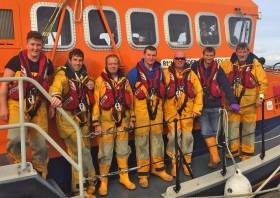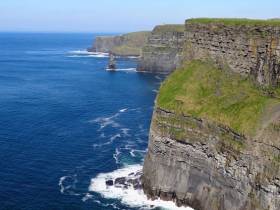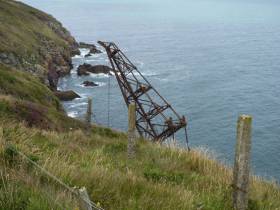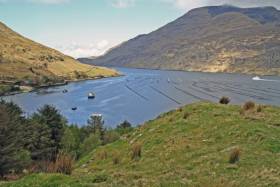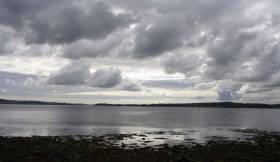Displaying items by tag: diving
#RNLI - Courtmacsherry RNLI's all-weather lifeboat was called out at 2.45pm yesterday afternoon (Sunday 2 October) as three divers and their support boat sought help as their vessel got into difficulties near Black Head off Kinsale.
The lifeboat was quickly away with a crew of seven and was on scene at 3.15pm to join Kinsale RNLI and the Irish Coast Guard boat from Oysterhaven.
As the divers and their boat were being brought back to shore, another call came from Valentia Radio of an injured crew person on board a sailing vessel off Kinsale Harbour.
Both the Kinsale and Courtmacsherry lifeboats assisted in the transfer of the female casualty to Kinsale Pier, where an ambulance was awaiting to take her to Cork University Hospital.
Conditions at sea today deteriorated from early afternoon with a Force 5 to 6 wind and a strong sea swell.
The cew on the Courtmacsherry lifeboat yesterday were coxswain Sean O'Farrell, mechanic Stewart Russell, Ciaran Hurley, Mark Gannon, Dara Gannon, Dean Hennessey and Evan O'Sullivan.
Diver Dies After Rescue Off Clogherhead
#Diving - TheJournal.ie reports on the death of a diver who got into difficulty off Clogherhead in Co Louth on Monday (29 August).
Clogherhead RNLI and the local Irish Coast Guard unit were called to the scene around 5.30pm on Monday afternoon, with the Dublin-based Rescue 116 winching the casualty from the water.
He was subsequently airlifted from Port Oriel to Our Lady Of Lourdes Hospital in Drogheda, where he was pronounced dead yesterday morning (Tuesday 30 August).
The Irish Mirror has more on the story HERE.
Divers Find Body Near Cliffs Of Moher
#CliffsOfMoher - Gardaí are investigating after divers discovered a body in the sea off the Cliffs of Moher yesterday afternoon (Sunday 14 August).
Members of the Burren Sub Aqua Club made the grim find around 3pm while on a diving exercise beneath the cliffs, as The Clare Herald reports.
At the same time, coastguard volunteers were called to assist a man on the cliff path above who was feared to have suffered a heart attack or stroke.
The Clare Herald has more on these stories HERE.
Man Dies While Diving Off Waterford Coast
#Diving - A man has died after getting into difficulty while diving off Ardmore in Co Waterford yesterday afternoon (Sunday 12 June).
Youghal RNLI's volunteer lifeboat crew were tasked to the incident between Goat Island and Ram Head near Ardmore, Co Waterford before 4.30pm.
On arrival they found a man in the water who they recovered onto the lifeboat, and immediately administered casualty care.
Working with Helvick Head RNLI, who were also on scene, the casualty was winched onto the Irish Coast Guard helicopter Rescue 117 and brought to Waterford University Hospital, where he was later pronounced dead, as the Irish Examiner reports.
A spokesperson for Helvick Head RNLI that a second diver who had been with the deceased had managed to swim to shore to raise the alarm, allowing for a swift emergency response.
Commenting on the callout, Youghal RNLI lifeboat operations manager Fergus Hopkins said: "This was a difficult callout for everyone concerned and our thoughts are with the family of the man who was taken from the water this afternoon."
Connemara Mussel Farmer Dies In Diving Incident
#Killary - The Irish Times reports on the death of a mussel farmer in a diving incident in Connemara at the weekend.
Marty Nee, who started a farm for rope-grown mussels in the area with his wife Catherine 16 years ago, died after getting into difficulty while diving in Killary Fjord on Saturday evening.
The loss of the 48-year-old Renvyle resident – a regular supplier to the annual Connemara Mussel Festival – has shocked the local community, according to Galway Bay FM.
Missing Diver Found Safe In Strangford Lough
#Diving - The UK Coastguard received a call just after 4.10pm yesterday afternoon (9 April) from a member of public reporting that a diver had not surfaced as expected in Strangford Lough near Ringhaddy, Co Down
Coastguard rescue teams from Portaferry and Bangor, the Portaferry RNLI lifeboat, the PSNI helicopter and the Irish Coast Guard's Rescue 116 helicopter based at Dublin were all sent to the area for the search.
Luckily the diver was found on the shore by local residents shortly after the coastguard were altered.
The Irish Coast Guard helicopter landed, with assistance from the UK Coastguard rescue teams. The diver was checked over by the on-board paramedic and after advice from a specialist doctor the diver was given the all-clear and allowed to make his own way home.
Graham Edgar, senior maritime operations officer with Belfast Coastguard, said: “This is a great outcome for all involved, the other diver’s in the group did exactly the right thing, they called us as soon as they realised he was missing.
"Fortunately the diver was found safe and well. We would urge all divers, as this diver did, to let someone know where they are planning to dive, when they are planning to come back and if possible dive within a group.
"Also keep a close eye on the weather and sea conditions and always dive within your limits."
Aquatic Discoveries Among 2015 Irish Science Breakthroughs
#Innovation - Two very different aquatic breakthroughs have been listed among Silicon Republic's top 10 Irish innovations of 2015.
Afloat.ie has previously reported on University of Limerick graduate Cathal Redmond, who took home €7,000 as a runner-up in the James Dyson Awards for his revolutionary new diving apparatus.
Redmond will use the funds to develop his Express Dive concept, a lightweight device that allows divers to refill their air supply on the goal – for a fraction of the cost of standard SCUBA gear.
Also covered this past summer on Afloat.ie was the discovery of a new habitat for coral in Irish waters.
Prof Andy Wheeler led an international team of marine scientists on the coral survey in June that ventured into the Porcupine Bank Canyon some 300km off Dingle and found an unexpected variety of life.
He added that it is "not unfeasible that there is over 100 sqkm of coral habitat that was previously unaccounted for."
Silicon Republic has more on the story HERE.
International Prize For Irish Diving Invention
#Diving - An Irish diving invention has won the runner-up prize of €7,000 in the international James Dyson Awards, as RTÉ News reports.
University of Limerick graduate Cathal Redmond rose above a field of 700 entries to scoop the funding to develop his novel 'Express Dive' concept.
As previously reported on Afloat.ie, Redmond won the Irish James Dyson Award and took home €2,500 earlier this year for his revolutionary device, which allows divers to refill the one-litre tank while out on the water, providing enough air for two minutes beneath the surface.
The next step for the product design and technology graduate is to bring the device to market. RTÉ News has more on the story HERE.
New Book Tells Story Of Irish Naval Divers
#Diving - One navy man's "accidental entry" into diving in the 1960s was the birth of what is today Ireland's most advanced underwater unit.
As the Irish Examiner reports, a new book by Martin Buckley titled The Ninth Ship - The Irish Naval Diving Section charts the history of the Naval Service's subaquatic division, which began when Lt Joe Deasy was sent to the UK for months of torpedo anti-submarine training.
Diving happened to be part of the curriculum, and Lt Deasy returned to Haulbowline in 1964 as the Naval Service's first qualified diver.
Within a decade the navy had chalked up its first major team diving operation, on the IRA gunrunning vessel Claudia, and later built a reputation as rescue experts, assisting in the wake of 1979's Bantry oil tanker explosion and the Air India disaster in 1985 among others.
The Irish Examiner has more on the story HERE.
Diving Ireland Recruiting Sports Development Officer
#Diving - Diving Ireland is recruiting for a Programmes Development Officer on a one-year contract.
The governing body for all underwater sport in Ireland under the Irish Underwater Council (CFT) describes the post as "an exciting opportunity to manage and spearhead [its] development programme."
The full-time position, based in Dublin, provides for operational and administrative support for the delivery of Diving Ireland's participation plans.
The Programmes Development Officer will be responsible for planning, delivering and evaluating a development plan for all Diving Ireland participation programmes and courses. These programmes will centre around increase in participation, membership and revenue.
The Programmes Officer will facilitate and co-ordinate opportunities through liaison with commercial providers and clubs, assisting in the planning and running of promotional events across all ages and abilities.
The Programmes Officer will also be responsible for the development and expansion of Diving Ireland's introductory and participation courses. The primary focus will be on capitalising on the potential of the ‘Snorkel Splash’ for introduction to schools as part of the PE curriculum.
Additionally, there will be the wider engagement of clubs and establishing strong working relationships with regional representatives, local authorities and other partners to support the implementation of the development plan.
The closing date for applications is Friday 19 June 2015. Full details of the position and how to apply are available at SportsJobs.ie.


























